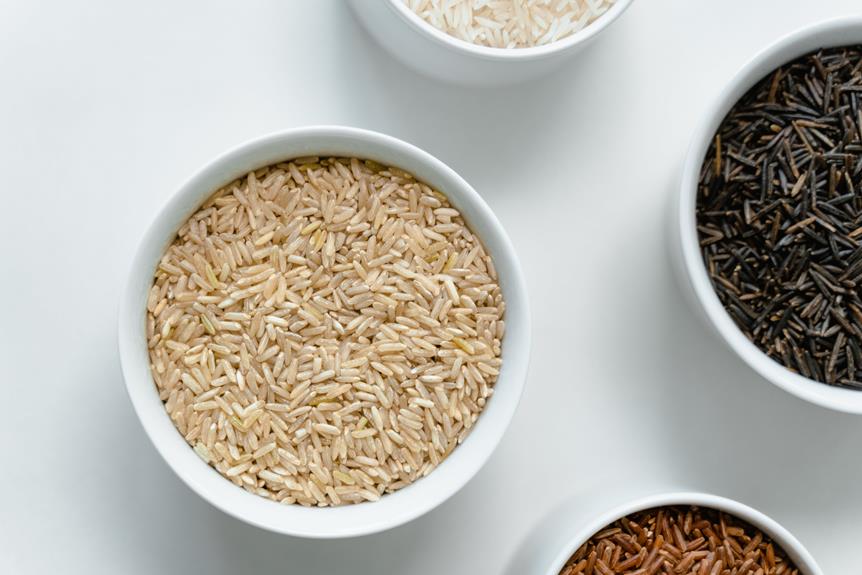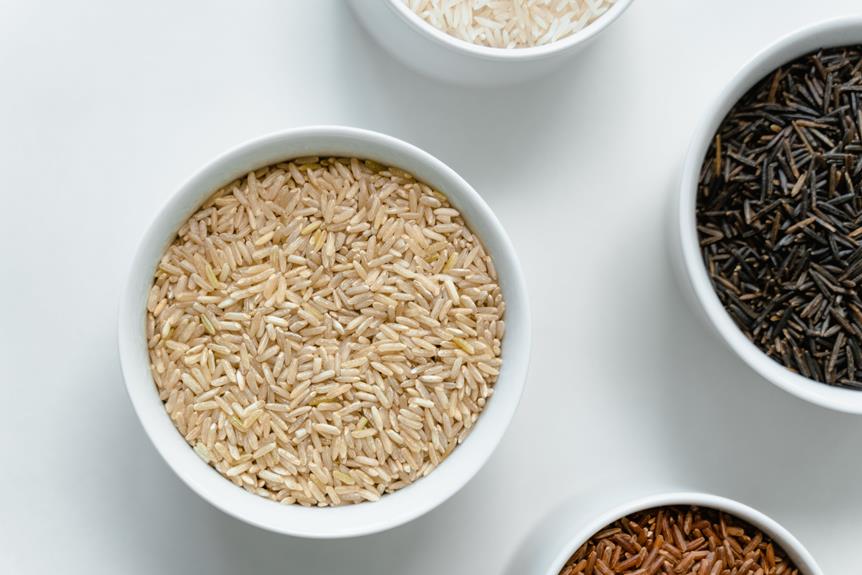Have you ever wondered how dietary fiber affects your gut health? Well, it turns out that this seemingly simple nutrient plays a crucial role in maintaining a healthy digestive system. Not only does it promote the growth of beneficial gut bacteria, but it also improves digestion and nutrient absorption. And that's not all – fiber helps regulate bowel movements and prevents both constipation and diarrhea. But what exactly is the mechanism behind these benefits? Stay tuned to find out more about the fascinating relationship between dietary fiber and your gut health.
Key Takeaways
- Dietary fiber promotes the growth of beneficial gut bacteria and helps maintain a balanced gut microbiome.
- Fiber improves digestion, nutrient absorption, and gut motility, while also acting as a natural laxative.
- Fiber helps regulate bowel movements, prevents constipation, and supports overall gut health.
- Consuming fiber-rich foods can prevent constipation, diarrhea, and digestive disorders, while also promoting disease prevention.
Promotion of Healthy Gut Bacteria
Dietary fiber actively promotes the growth of beneficial gut bacteria, improving your overall gut health. How does it do this? Well, dietary fiber is not fully digested by your body. Instead, it passes through your digestive system relatively intact, reaching your colon where it becomes food for the bacteria living there. These bacteria break down the fiber through fermentation, producing short-chain fatty acids (SCFAs) as a byproduct.
SCFAs play a crucial role in maintaining a healthy gut environment. They provide an energy source for the cells lining your colon, helping to keep them nourished and functioning properly. Additionally, SCFAs help regulate the pH level in your gut, creating an environment that is favorable for the growth of beneficial bacteria and inhibiting the growth of harmful bacteria. This balance is essential for maintaining a healthy gut microbiome.
Improved Digestion and Nutrient Absorption
To improve your digestion and nutrient absorption, incorporating dietary fiber into your diet is essential. Dietary fiber plays a crucial role in promoting a healthy gut and ensuring that your body efficiently absorbs the nutrients it needs. Here are four ways in which dietary fiber can improve your digestion and nutrient absorption:
- Increased stool bulk: Fiber adds bulk to your stool, making it easier to pass through your digestive system. This helps prevent constipation and promotes regular bowel movements, ensuring that waste products and toxins are efficiently eliminated from your body.
- Improved nutrient absorption: Fiber helps slow down the digestion process, allowing your body more time to absorb essential nutrients from the food you eat. This is especially important for nutrients like vitamins, minerals, and antioxidants, which are crucial for maintaining overall health and preventing nutrient deficiencies.
- Enhanced gut motility: Fiber acts as a natural laxative, stimulating the muscles in your digestive tract to move food through more efficiently. This helps prevent issues like bloating and indigestion, allowing for smoother digestion and improved nutrient absorption.
- Feeding beneficial gut bacteria: Certain types of dietary fiber, known as prebiotics, serve as food for the beneficial bacteria in your gut. These bacteria play a vital role in maintaining a healthy gut microbiome, which is important for overall digestive health and nutrient absorption.
Regulation of Bowel Movements
In order to regulate your bowel movements and maintain a healthy digestive system, incorporating dietary fiber into your diet is crucial. Dietary fiber plays a vital role in promoting regular bowel movements by adding bulk to your stool and preventing constipation. It acts as a natural laxative, stimulating the muscles in your intestines and promoting the movement of waste through your digestive system.
By consuming an adequate amount of dietary fiber, you can help regulate your bowel movements and prevent both constipation and diarrhea. Fiber can absorb water, making your stool softer and easier to pass, while also speeding up the transit time through your digestive system.
To give you a better idea of the fiber content in common foods, here is a table that shows the amount of fiber in a 100-gram serving:
| Food | Fiber Content (g) |
|---|---|
| Black beans | 16.6 |
| Raspberries | 6.5 |
| Whole wheat pasta | 5.1 |
| Broccoli | 2.6 |
As you can see, incorporating fiber-rich foods like black beans, raspberries, whole wheat pasta, and broccoli into your diet can help regulate your bowel movements effectively. It is important to note that it is recommended to consume a variety of fiber sources from both soluble and insoluble fibers to obtain the full benefits for your digestive health.
Prevention of Constipation and Diarrhea
Incorporating fiber-rich foods into your diet can help prevent both constipation and diarrhea. Fiber plays a crucial role in maintaining a healthy digestive system by promoting regular bowel movements and supporting gut health. Here are four ways in which fiber helps prevent constipation and diarrhea:
- Promotes regular bowel movements: Fiber adds bulk to your stool, which helps regulate bowel movements and prevents constipation. It acts like a sponge, absorbing water and making your stool softer and easier to pass.
- Adds moisture to the stool: Insoluble fiber, found in foods like whole grains and vegetables, adds moisture to the stool, preventing it from becoming dry and hard. This makes it easier to pass and reduces the risk of constipation.
- Regulates bowel habits: Soluble fiber, found in foods like oats and legumes, forms a gel-like substance in the intestines. This helps regulate bowel habits by slowing down the digestion process, allowing for better absorption of nutrients and preventing diarrhea.
- Maintains a healthy gut environment: Fiber serves as food for the beneficial bacteria in your gut, known as probiotics. These bacteria help break down fiber into short-chain fatty acids, which nourish the cells lining your colon and promote a healthy gut environment.
Support for Overall Gut Health
To maintain optimal gut health, it is important to focus on supporting the overall well-being of your digestive system. Taking steps to support your gut health can have a positive impact on your overall health and well-being. One way to support your gut health is by consuming a diet rich in dietary fiber.
Dietary fiber plays a crucial role in supporting overall gut health. It acts as a prebiotic, providing nourishment for the beneficial bacteria in your gut. These bacteria help maintain a healthy balance in your gut microbiome, which is essential for proper digestion and nutrient absorption. By promoting the growth of beneficial bacteria, dietary fiber helps to maintain a healthy gut environment.
In addition to nourishing the gut microbiome, dietary fiber also helps to regulate bowel movements. It adds bulk to your stool, making it easier to pass through the digestive tract. This can help prevent constipation and promote regularity.
Furthermore, dietary fiber has been shown to reduce the risk of certain digestive disorders, such as diverticulitis and hemorrhoids. It can also help lower cholesterol levels and control blood sugar levels, reducing the risk of heart disease and type 2 diabetes.
To support your overall gut health, aim to include a variety of high-fiber foods in your diet. Good sources of dietary fiber include fruits, vegetables, whole grains, legumes, and nuts. It is recommended to consume at least 25-30 grams of fiber per day, but it is important to increase your intake gradually to avoid any gastrointestinal discomfort.
Frequently Asked Questions
How Much Dietary Fiber Should I Consume Daily to Maintain a Healthy Gut?
To maintain a healthy gut, you should aim to consume a sufficient amount of dietary fiber daily. Research suggests that the recommended daily intake of fiber for adults is around 25-30 grams. However, individual needs may vary depending on factors like age, sex, and overall health. It is important to include a variety of fiber-rich foods in your diet, such as fruits, vegetables, whole grains, and legumes, to support optimal gut health.
Can Dietary Fiber Help With Weight Management?
Dietary fiber can indeed help with weight management. It adds bulk to your diet, making you feel fuller for longer periods of time. This can prevent overeating and snacking on unhealthy foods. Additionally, fiber helps regulate your blood sugar levels by slowing down the absorption of carbohydrates. This can prevent spikes in your blood sugar and help maintain a stable energy level throughout the day. Including fiber-rich foods in your diet is a great way to support your weight management goals.
Are There Any Risks or Side Effects Associated With Consuming Too Much Dietary Fiber?
Are you wondering about the risks or side effects of consuming too much dietary fiber? It's important to note that consuming excessive amounts of fiber can lead to bloating, gas, and abdominal discomfort. Additionally, it may interfere with nutrient absorption and cause deficiencies. It's recommended to gradually increase your fiber intake and drink plenty of water to minimize these risks. Consulting with a healthcare professional can provide personalized guidance and ensure a balanced diet.
Can Dietary Fiber Improve Symptoms of Irritable Bowel Syndrome (Ibs)?
Dietary fiber can potentially improve symptoms of irritable bowel syndrome (IBS). It helps to regulate bowel movements and promote overall gut health. By adding more fiber to your diet, you may experience relief from symptoms such as abdominal pain, bloating, and constipation. However, it is important to start slowly and gradually increase your fiber intake to avoid any discomfort. Consulting with a healthcare professional or registered dietitian is recommended for personalized advice.
Is There a Difference Between Soluble and Insoluble Fiber in Terms of Their Impact on Gut Health?
There is indeed a difference between soluble and insoluble fiber when it comes to their impact on gut health. Soluble fiber dissolves in water and forms a gel-like substance in the digestive tract, which helps to slow down digestion and regulate blood sugar levels. Insoluble fiber, on the other hand, adds bulk to the stool and promotes regular bowel movements. Both types of fiber are important for maintaining a healthy gut and preventing digestive issues.




